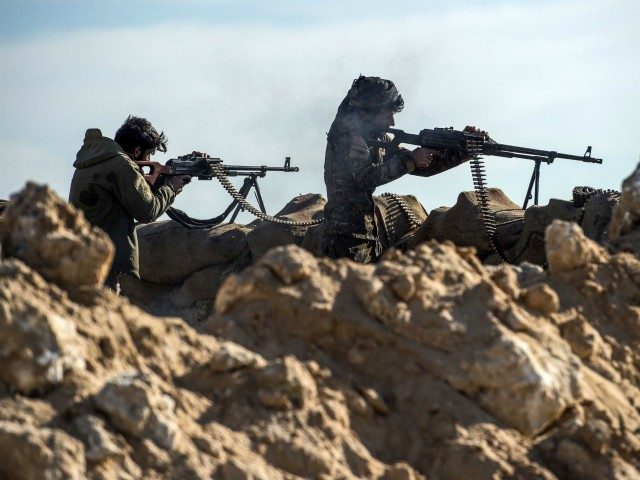The Syrian Democratic Forces (SDF), a Kurdish-led coalition of fighters in Syria allied with the United States, announced on Monday an attack, apparently by Iran-backed militias from Iraq, on an American base killed at least six of their fighters.
In addition to evidence linking them to the attack, the “Islamic Resistance in Iraq” – a nebulous name used by several mostly Shiite Iranian-backed militias in the country – independently claimed responsibility, claiming they used drones to attack the base in Deir ez-Zor, Syria.
The attack is the latest in a series of dozens of attacks attributed to the Islamic Resistance in Iraq or the Iranian government directly on American positions in the Middle East. The Pentagon has documented over 160 drone strikes, missile assaults, and other attacks on U.S. assets in Syria and Iraq since the October 7 terrorist assault on Israel by the Iran-backed Sunni jihadists of Hamas.
Hamas invaded Israel that day and engaged in a rampage against civilians, killing entire families in door-to-door raids on residential communities, executing women during gang rape assaults, torturing and killing children as young as infants, and abducting an estimated 250 people, of which over 100 remain in jihadist custody. In response to the slaughter, the government of Iran threw a massive street party featuring free lemonade and fireworks in Tehran. Iran’s terrorist proxies have initiated a campaign against Israel, the United States, and the greater West in support of Hamas that remains currently in vigor.
America still maintains an estimated 2,500 troops in Iraq and 900 in Syria intended to aid local forces in protecting against a resurgence by the Islamic State. Iranian proxies have most fervently targeted them, succeeding in killing Americans on January 28 in a strike on the border between Syria and Iraq. Three Americans died in that drone attack, also attributed to the “Islamic Resistance in Iraq.”
The attack on the SDF appears to be part of the same campaign. According to the Kurdish news outlet Rudaw, a “suicide plane” targeted a training camp at an American base.
“Six of our fighters were martyred during a terrorist attack by a suicide plane originating from areas controlled by Syrian regime mercenaries, targeting a training academy in the al-Omar field east of Deir ez-Zor,” a statement issued by the SDF read. The Kurdish-led forces did not indicate that any Americans were injured in the attack. An SDF spokesman, Farhad Shami, later added that “initial investigations have confirmed that the Iranian-backed militias were behind the one-way UAV terrorist attack against our forces in the Al-Omar oil field in Deir Ezzor.”
The “Syrian regime” is the Damascus-based entity run by dictator Bashar al-Assad, who survived a decade of civil war in power thanks to ample support from Iran and its top ally, Russia. The civil war created a vacuum in the country that the Islamic State, a Sunni jihadist organization, exploited to establish a “caliphate” spanning Syria and Iraq. Assad forces did little to combat the Islamic State, instead targeting anti-Assad rebel forces, while the SDF and its U.S. allies did the bulk of the fighting against ISIS.
The SDF’s largest contingent is part of the People’s Protection Units (YPG/YPJ), the most prominent Kurdish armed forces in Syria. The YPG is part of a Syrian Kurdish political movement seeking to establish a sovereign Kurdistan, one of several such organizations in the region. It operates separately, and is sometimes at odds with, the Kurdistan Regional Government (KRG) of Iraq and its military, the Peshmerga, though both have come under attack by Iran-backed forces since October 7. Both maintain friendly relations with the United States.
In November, the “Islamic Resistance in Iraq” claimed a flurry of drone attacks on U.S. positions in Iraq and Syria that included the bombing of a location near Erbil, the capital of the KRG.
“Three explosive-laden drones attacked a military base of the international coalition against the Islamic State in two separate instances,” the Kurdish Directorate-General of Counter-Terrorism (CTD) said in a statement about the Erbil attack. Reports on the attack did not indicate any American casualties.
In January, the Islamic Revolutionary Guard Corps (IRGC) – a U.S.-designated terrorist organization and formal wing of the Iranian armed forces – killed multiple civilians in Erbil during a strike it claimed was intended to eliminate a “Mossad base” in the Kurdish capital. The IRGC claimed the bombing was not in support of Hamas but, rather, retaliation for a terrorist attack on a memorial service for late IRGC terror mastermind Qasem Soleimani, killed in an airstrike ordered by former President Donald Trump on January 3, 2020. The Islamic State claimed responsibility for the Soleimani memorial bombing but the Iranian Islamic regime claimed that the Islamic State was a proxy of America and that a “Zionist grudge” had led them to target the event.
In reality, no evidence exists that the IRGC strike targeted a “Mossad base,” and the KRG denies the presence of any Israeli assets in the area. The bombing destroyed the home of a local businessman, Peshraw Dizayee, killing him and daughter Zhina, who would have turned one year old ten days after her death.
“Dizayee’s wife Hana Jutyar, 7-year-old son Rawan, 26-year-old Rozh, and one of their housekeepers were wounded in the attack. Rozh has reportedly lost one of his hands in the attack. One housekeeper also died as a result of the strike,” Rudaw reported at the time.
The strike did not destroy any American assets, Israeli assets, or any political structure.

COMMENTS
Please let us know if you're having issues with commenting.